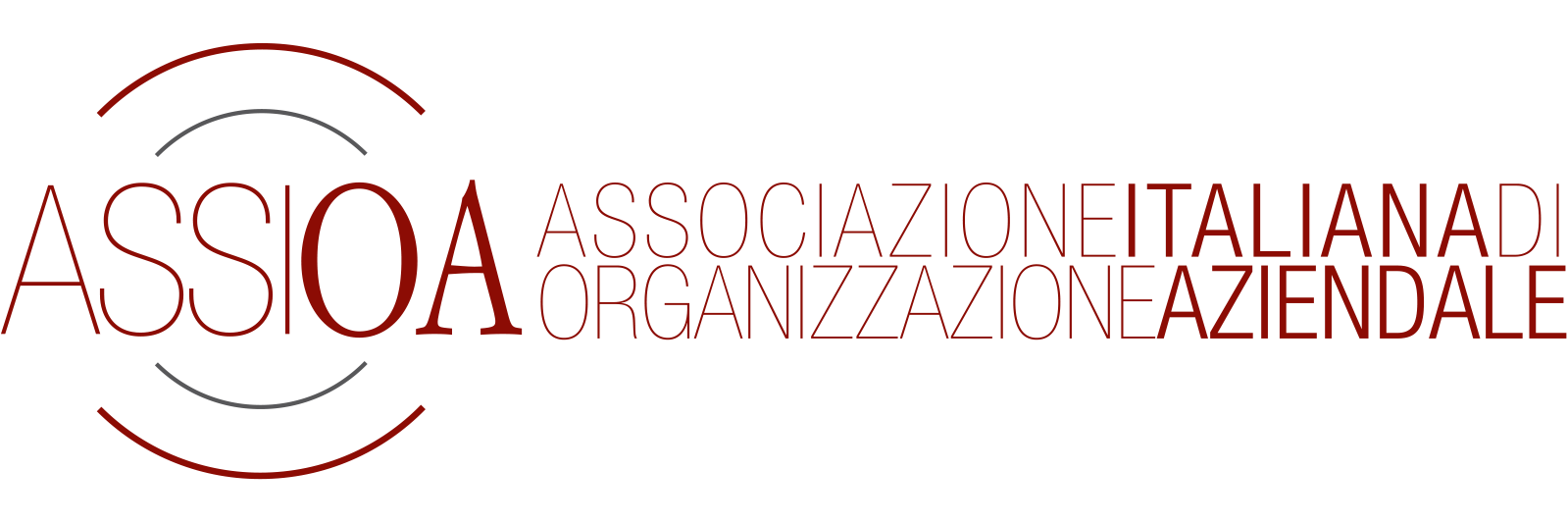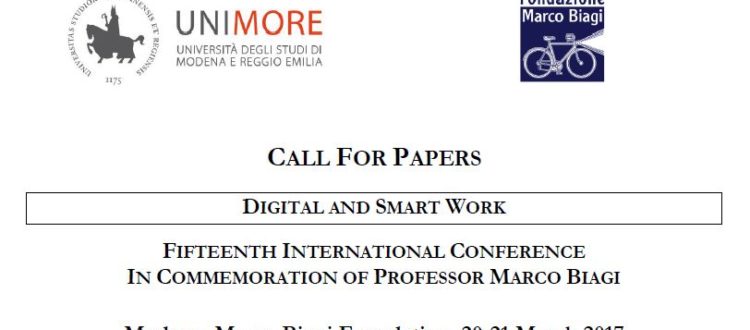DIGITAL AND SMART WORK
FIFTEENTH INTERNATIONAL CONFERENCE
IN COMMEMORATION OF PROFESSOR MARCO BIAGI
Modena, Marco Biagi Foundation, 20-21 March 2017
“Digitalization” is one of the catchwords used to define the changes resulting from the application of IT to business models, productive processes and work organization. Related expressions in this regard are the “gig-economy”, the “platform economy” and “Industry 4.0”, to name but a few. Whereas Industry 4.0 has been explained in policy-making as the comprehensive transformation of the whole sphere of industrial production through the merging of digital technology and the internet with conventional industry, the gig economy alludes to specific forms of performance of services, known as “crowdsourcing”, “crowdworking” and work on demand, operated by digital platforms. Digitalization is therefore a multi-faceted and far-reaching phenomenon, with an impact on every sector of the economy and a wide array of work activities, thus calling for an in-depth investigation of the possible effects on the domain of employment relations.
Focusing on the implications for employment, digitalization may be provisionally defined as encompassing work operations and processes brokered, organized or performed within digital platforms or by means of digital devices. In this perspective, digitalization cuts across different forms of employment (standard and non-standard), work organization (in-house performance and ICT-based mobile work), categories of workers (skilled and unskilled) and productive processes (material and immaterial). As pointed out in the literature, different forms of digitalization represent a continuum, ranging from partially to fully digitalized workplaces and employment relationships. Taking this as a starting point, it may be argued that, despite certain differences, the impact of digitalization on employment relations presents certain general features as regards both opportunities and challenges.
On the one hand, digital tools can be conceived as a means to establish more horizontal and cooperative relationships within organizations and to provide “smart” workers with greater flexibility in the definition of their working schedules, enhancing self-determination in the performance of work, while providing better opportunities to match their skills with the demand for labour, given the potential detachment of labour supply from any physical or geographical boundary. Furthermore, it entails a significant job creation potential, insofar as it can lead to an increase in productivity and the development of a production system based on innovation, possibly linked to the re-shoring of previously outsourced operations and the reconfiguration of business models (“selling light not light bulbs”).
On the other hand, digitalization represents a challenge for the common theoretical categories of employment relations as well as the material conditions of workers. From a labour market perspective, it entails the risks of obsolescence of jobs, especially low-skilled ones, and the deskilling of workers as they are made more and more dependent on the input from highly sophisticated digital platforms and devices (“smart factories for dumber workers”). The final outcome of those processes may be an increase in unemployment, segregation and inequality. From a management perspective, the use of digital devices requires new patterns of job design and job evaluation, capable of instantiating additional and invisible command-and-control features in working processes, allowing for the continuous real- time monitoring and evaluation of worker performance. Another effect may be a trade-off between organizational flexibility and more intensive workloads, both in qualitative (e.g. degree of cognitive effort) and quantitative terms (working hours). All of the above may lead to a deterioration of worker health and safety, with a heightened risk of work-related stress.
All of the developments mentioned above have major repercussions on the normative and regulatory patterns of employment relations. First, certain forms of work in the “gig-economy”, such as crowdworking and work on demand, pose the problem of the lack of protection of workers, due to their uncertain employment status. This is because the theoretical apparatus of labour law comes under strain with regard to the classification of such new forms of employment, that apparently lack any clear linkage with the traditional parameters of salaried employment. In this respect, several proposals have been put forward, ranging from the identification of a new category of employment to the interpretative adaptation of existing categories, so that they can include workers described as “digital galley slaves”, casting light on the creeping processes of commodification and casualization affecting them. In a broader perspective, the challenges outlined above require either a revision or a reinterpretation of existing regulatory and policy tools, including job classification and job rotation, personal data protection, the reach of employee surveillance, working time arrangements, training and other means to address the obsolescence of skills, such as social services and income support.
The need to revise and adapt the existing system of rights and protections has implications for collective representation and the role of industrial relations and social dialogue. Whereas digitalization poses an additional challenge to persistent attempts to represent collective interests and develop forms of solidarity in a changing world of work, some argue that the involvement of employees, by means of information, consultation and co-determination, is key to managing the restructuring processes and handling the “anticipation of change” issues linked to digitalization, while others maintain that the development of peer-to-peer and on-line platforms opens up new pathways for the organization of workers beyond traditional workplaces, with a view to strengthening the new “communities” and reinforcing their collective action and power of collective negotiation.
Several attempts have been made recently to ensure the practical adaptation of the employment relations machinery to the questions raised by digitalization. They range from judicial responses to cases relating to the employment status of Uber drivers in the USA and the UK, to the legal regulation of specific issues prompted by digital work, such as the revision of limitations on the on-line surveillance of employees and the draft regulation on “smart work” in Italy, as well as the initiatives set up by IG Metall in Germany, such as the establishment of an Advisory Board on the Future of Work, and the creation of an internet platform (FairCrowdWork Watch) in an attempt to organize such workers.
Against this backdrop, there is a need to establish an integrated framework of knowledge on work digitalization, build a sound taxonomy of the phenomena under investigation, examine their impact, delineate future perspectives and put forward a comprehensive set of proposals. In order to bring the discussion forward, enhancing the exchange of views and promoting an interdisciplinary debate, the conference will seek contributions from the international scholarly community on the following tracks
- Digitalization and management practices.
- Digitalization, productivity and the labour market.
- Digitalization, employment rights and collective representation.
SUBMISSIONS
Participants who intend to contribute a paper to one of the conference strands should submit by 1st July 2016 an expression of interest, indicating:
- the title of the proposed paper;
- a brief description of about 150 words (bibliography excluded), that should present the topic and highlight the nature of the paper (theoretical analysis, strategic paper, presentation of empirical data etc);
- the paper’s disciplinary or inter-disciplinary background (e.g. Labour Law, Organization Theory, Labour Economics);
- the author’s affiliation;
- the conference track where the paper is intended to be included. In this respect, the Organising Committee reserves the right to assign papers to the track and session they consider to be most appropriate.
Expressions of interest will selected by the Organising Committee by 22 July 2016.
Selected authors will be invited to present an extended abstract (2000 words, bibliography excluded) no later than 15 September 2016. Abstracts shall include a brief discussion of the results and conclusions that the paper aims to present.
Extended abstracts will be selected by the Organising Committee by 30 September 2016.
Selected authors shall submit a full paper of about 8000 – 10000 words by 20 December 2016. Full papers should present a complete piece of research and not be limited to the description of a work in progress.
As an alternative to the presentation of a full paper, in case of impossibility to accommodate all the proposals in the oral presentations sessions, the Organising Committee may offer the opportunity to present an author’s work in dedicated poster sessions.
The Organising Committee reserves the right to refuse full papers that are not consistent with the conference strands or with the expression of interest/full abstract that have been approved.
The working languages of the conference will be English and Italian. Abstracts and papers may be submitted either in English or in Italian.
DEADLINES
- Deadline for submission of expressions of interest: 1st July 2016
- Deadline for submission of extended abstracts: 15 September 2016
- Deadline for submission of full papers: 20 December 2016
ORGANISING COMMITTEE
Prof. Tindara Addabbo (University of Modena and Reggio Emilia), Prof. Edoardo Ales (University of Cassino and Southern Lazio), Dr. Ylenia Curzi (University of Modena and Reggio Emilia), Prof. Tommaso Fabbri (University of Modena and Reggio Emilia), Dr. Olga Rymkevich (Marco Biagi Foundation), Dr. Iacopo Senatori (Marco Biagi Foundation), Dr. Carlotta Serra (Marco Biagi Foundation), Prof. Giovanni Solinas (University of Modena and Reggio Emilia).
SCIENTIFIC COMMITTEE
Prof. Marina Orlandi Biagi (Marco Biagi Foundation, Chair), Prof. Tindara Addabbo (University of Modena and Reggio Emilia), Prof. Edoardo Ales (University of Cassino and Southern Lazio), Prof. Francesco Basenghi (University of Modena and Reggio Emilia), Prof. Janice Bellace (The Warthon School, Philadelphia), Prof. Susan Bisom-Rapp (Thomas Jefferson School of Law, San Diego), Prof. Roger Blanpain (Universities of Leuven and Tilburg), Prof. Tommaso Fabbri (University of Modena and Reggio Emilia), Prof. Luigi E. Golzio (University of Modena and Reggio Emilia), Prof. Csilla Kollonay-Lehoczky (Central European University, Budapest), Prof. Alan Neal (University of Warwick), Prof. Jacques Rojot (University of Paris II Panthéon-Assas), Prof. Yasuo Suwa (Hosei University), Prof. Tiziano Treu (Catholic University of Milan), Prof. Manfred Weiss (J.W. Goethe University, Frankfurt am Main).
CONTACTS
Expressions of interest, abstracts and full papers, as well as the requests of information thereof, shall be addressed to: Iacopo Senatori (Researcher, Marco Biagi Foundation): iacopo.senatori@unimore.it
The first draft of the conference programme will be made available in January 2017.
Further information will be posted on the Marco Biagi Foundation’s web site www.fmb.unimore.it




